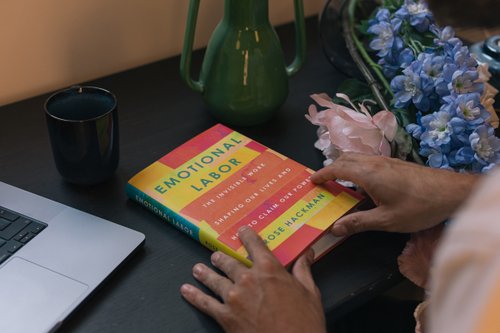How to get things done in a crisis
Jan 04, 2024
6 mins


Vikki is a freelance writer and CEO of Time Hackers, which helps individuals and teams achieve more, faster, without working longer hours. She also hosts the top 1% “Hack Your Time” podcast. She’s based in Manchester and is a toddler mum.
We aren’t just living in times of crisis – we’re living in times of back-to-back crises. It has felt that way since 2020, and it doesn’t look like it’s slowing down any time soon. Yet, we also live in a productivity-focused world where it’s impossible to put our work on hold while we rest and recover. That’s taking a toll and some of us are struggling to cope. “I’ve barely been sleeping for the past couple of months,” says Jenny Greenberg in New York. “I get up with some energy but have a very difficult time concentrating on my work.”
Being able to get things done even when the world seems to be falling apart has become a necessary skill of our time, and yet so often the information provided to support us in this area offers little more than advice on how to create a “morning routine” or to use clever “scheduling.”
The sad truth is that when you are living through a crisis, even the idea of taking the steps involved in many idealised morning routines, such as planning ahead, stretching or taking a cold shower, can feel more daunting than ever. So if you’re not doing these things, then know that there is nothing wrong with you. These steps are optional when it comes to getting things done at the best of times, but especially during a crisis.
What exactly is a crisis?
A crisis, simply defined, is a time of intense difficulty or danger. We can experience crises in our personal lives and, thanks to technology and globalization, we feel the effects of global crises too. The fact that we are more connected than ever comes with repercussions: we are more aware of crises around the world, whether in the Middle East, Europe or Washington. This is why we can feel like we are drowning in ongoing stress and anxiety. This has been the experience of Yael Bendahan in Israel. “I’m finding it very hard to focus on things,” he says. “[I’m] spending a lot more time aimlessly on my phone because my brain isn’t functioning [at] 100%.”
If you are struggling to get things done right now, know that you aren’t alone. It makes complete sense that living in a crisis and experiencing the associated stress makes us less productive. Greenberg says, “I feel very stunted in my creativity because my brain is trying to carry out basic functions first.” Here are some factors affecting our ability to get things done:
- Two-thirds of workers believe the cost of living is outpacing their salary, according to a Bank of America survey. “Against a backdrop of inflation and economic uncertainty, 64% of employees are stressed about their finances,” it says.
- The National Bureau of Economic Research found that during crises such as natural disasters or health emergencies, there’s a significant drop in work hours and productivity due to disruptions in infrastructure and daily routines.
There are obvious disruptions that affect our ability to get things done during a crisis, such resource limitations as we struggle to access supplies, funding or labor. Then there are physical disruptions that can happen through direct infrastructure damage, and there’s the human factor.
Simply put, our brains are different during times of crisis, and this will directly affect our productivity. “I haven’t been able to sell properly in my business for months,” says Bendahan. “Things have seemed so pointless, and it’s definitely affected my bottom line.”
How your brain reacts in times of crisis
Our brain has one job to do – and that is to keep us alive. So during times of crisis, it acts differently. Here’s a breakdown of what happens in the brain:
- Our limbic system – which is designed to assess danger, control our emotions and emotional experience, process stress and create a fight or flight response – goes into overdrive. This means we are more on edge, more reactive, have a faster response time and are more prone to dramatizing situations.
- Our prefrontal cortex, which is responsible for problem-solving, intentional thinking, rational decision-making and thinking about long-term consequences, is suppressed. This happens easily and often during perceived danger and when we are living in crisis. This can result in rash and unsustainable decision-making, going back and forth on decisions made, and making decisions that aren’t in our best interests.
- The brain signals for hormones to be released, such as cortisol and adrenaline, according to the American Psychological Association. This can create a faster heart rate, sweating, temporary hearing loss and impaired vision as our brain wants to focus on one thing: survival – which would have benefited it in the wild, where our brains evolved. It also impacts memory, attention and focus.
These three things combined directly affect our ability to get things done. What this tends to look like in real life is:
- Starting, stopping, and then starting over again and again
- Being more likely to try to multitask, task-hop
- Finding it harder to focus and think clearly
- Erratic, contradictory decision-making
- More likely to people please and give in to peer pressure
- Unable to take action, freezing, simply not getting things done
So, if you are finding it challenging to get things done as you live through a crisis, then know that it is by design. Put it down to nature. There is absolutely nothing wrong with you despite what your productivity programming may have you think.
This is why the idea that a flawless “morning routine” or “perfect plan” will support you in getting things done is useless at best and may be harmful at worst. The problem with strict morning routines is that we tend to feel upset or thrown when we don’t follow through with them perfectly, according to Michael Easter, author of The Comfort Crisis. And what do you think is most likely to happen during a time of crisis? Yes, it’s more likely than ever that you won’t get a chance, or have the will, to put yourself through some idealised routine or punishing schedule.
How to take charge of yourself again
So when your brain is struggling and you can’t seem to get things done, instead of giving yourself more decisions to make and more things to do, please stop adding tasks and requirements onto yourself. You have to get things done during a crisis, but you don’t have to get all the things done during a crisis. So here are the steps to follow to get your most important things done:
Decide not to criticize or judge yourself because you are operating differently.
This only serves to distract and slow you down. Instead, understand why you are operating differently and continue to partner with your brain and yourself since you are on the same team.
Decide to drop the rules you have been following even if they work really well for you outside of a crisis. Let the morning routine evolve, or get dropped completely. Instead of focusing on what you used to be able to do, ask yourself what you want to be doing and what you feel capable of doing, and start there. We highly recommend dropping the term “rules” and instead opting for “guidelines” to allow for flexibility and your evolving brain.
Decide that success looks different than it did in the past so you can continue to experience it even as you live through a crisis. Let it be smaller than it used to be and celebrate it all. Teresa Amabile and Steven Kramer explain in The Progress Principle: Using Small Wins to Ignite Joy, Engagement and Creativity at Work that forward momentum in meaningful work is the key to boosting motivation and success. It’s less about doing it perfectly or doing it all, but about doing what matters to you, just by getting in motion.
Decide to feel your feelings. Emily Bucher, a psychiatric counselor at The Ohio State University Wexner Medical Center, shares the value of allowing our emotions in a blog post for the university. She reminds us why our emotions exist: they are simply a form of communication. They may warn us of potential danger, for example. She emphasizes the simple step of emotional labeling and how it validates our emotional experience and allows us to ride emotional waves. Suppressing our emotions actually creates more stress. Cry. Run. Yell. Move. Give yourself an outlet.
Decide to communicate what is happening with your team and community. Seek support in a variety of ways. This may mean setting an “out of office” response to emails or getting a babysitter to help with the kids. Reminder: there’s no such thing as too much support and, when you are supported, everybody and everything in your life is also supported.
The truth is this: You will be doing less, but you can do less better when you stop expecting things to be different. According to Darren Hardy, the former publisher of Success magazine and New York Times best-selling author on the topic of achievement, everything we do or don’t do has a compound effect. (He even wrote a book with that title.) This matters even more when we are working less. You can either experience the compound effect of criticism and shame. Or you can experience the compound effect of high-value work. What will you choose for yourself?
Photo: Thomas Decamps for Welcome to the Jungle
Follow Welcome to the Jungle on Facebook, LinkedIn, and Instagram to get our latest articles every day, and don’t forget to subscribe to our newsletter!

More inspiration: Mental health

‘We need each other’: Monika Jiang on combating loneliness in hybrid work
Hybrid work offers flexibility but can leave us feeling disconnected. Monika Jiang explores how we can rebuild workplace connections.
Dec 19, 2024

Struggling at work? Here are 3 steps to rebuilding your self-esteem
Low on confidence? Learn how reflection, recharging, and refocusing can help you rebuild self-esteem and thrive professionally.
Nov 27, 2024

10 ways to beat the Sunday Scaries
Even people who love their jobs can experience the Sunday Scaries. Psychologist Karen Doll offers several strategies to help manage and overcome it.
Sep 12, 2024

Unpacking the burden of emotional labor
Rose Hackman’s "Emotional Labor" reveals how managing emotions impacts everyone, especially women and minorities.
Aug 08, 2024

Is financial anxiety harming your productivity?
Feeling overwhelmed by financial anxiety? You're not alone. Discover practical steps and expert advice to regain control of your work-life balance.
Jul 31, 2024
The newsletter that does the job
Want to keep up with the latest articles? Twice a week you can receive stories, jobs, and tips in your inbox.

Looking for your next job?
Over 200,000 people have found a job with Welcome to the Jungle.
Explore jobs